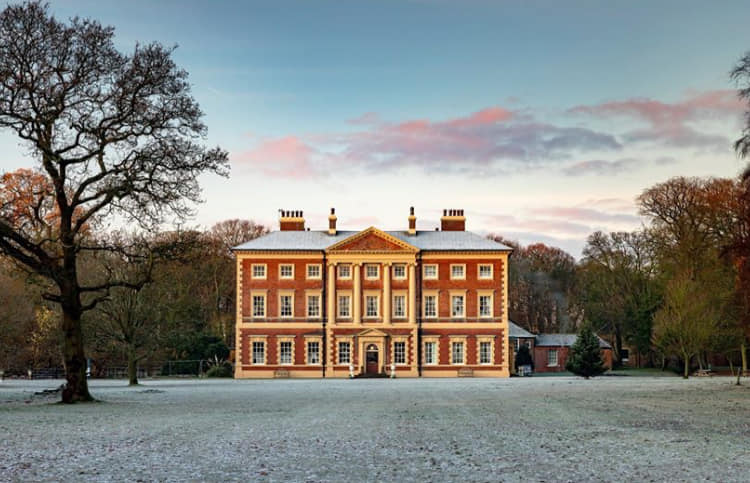The site of Lytham Hall has a long and varied history. In the late 1100’s, the Benedictine monks of Durham set up a Priory which lasted until the mid-1500’s. After the dissolution of the monasteries, the crown gave the land to the Molyneux family. In 1606, Sir Cuthbert Clifton of Westby bought the land from the Molyneux family in order to build the first Lytham Hall, a large Jacobean mansion, much of which still exists today.
In 1752, Squire Thomas Clifton commissioned the renowned architect, John Carr of York. After 5 years on the drawing board, the foundations were laid in 1757. Carr completed the Hall in 1764. No expense was spared and Carr employed the Italian Giuseppe Cortese to produce fine plasterwork ceilings. Gillows of Lancaster were also commissioned to furnish the Hall with the finest quality fittings.
Some of the existing Jacobean buildings were used in the new design to create a Long Gallery, as well as servants’ quarters for key staff. This meant all 3 levels of the new Georgian Hall could be used exclusively for the family and guests. The Clifton family lived at Lytham Hall from 1606 until 1963. The last Squire, Henry Talbot de Vere Clifton (known as Harry), inherited the Lytham Estate in 1928. His father, John Talbot Clifton, was a great explorer and travelled the world over, bringing back many souvenirs. He was an avid hunter and had a love for taxidermy which filled the North Entrance and the rear staircase which led to his Billiard room.
Harry loved to gamble and drink. He was a socialite, mixing in high society in London, Los Angeles, Monte Carlo and other fashionable places across the globe. In the early 1930’s he placed a $150,000 bet on a game of poker, losing the equivalent of $3,000,000 in minutes. This “English Aristocrat” made the press either side of the pond.
Harry became acquainted with the author Evelyn Waugh whilst at Oxford. Many claim that Waugh used his experience of Harry to develop the character of Sebastian Flyte in his Brideshead Revisited. Harry’s devout Catholic mother, Violet Clifton, entertained Waugh at Lytham Hall. It is also claimed she barred Waugh from ever visiting Lytham again, suspecting that the stern character of Lady Marchmain was based on her.
Harry was mostly absent from Lytham Hall, only visiting his mother occasionally. Violet spent her time writing and produced numerous books. Due to her devout Catholic faith, she spent many periods of time in convents after her husband’s death. Violet lived at the Hall until her death on the 20th November 1961.
After his mother’s death, Harry had amassed huge debts and substantially mortgaged the Lytham estate. Much of the debt was to the Guardian Assurance Company who wanted to foreclose. They came to an agreement and in 1963 the Lytham Estates passed into their ownership, bringing to an end four centuries of Cliftons at Lytham Hall.
Guardian Assurance used the upper floors as offices and the ground floor to entertain clients. The West Wing was used for training and corporate events. In the mid 90’s they put the Hall up for sale. In 1997, Lytham Town Trust, with a huge donation from British Aerospace, secured the purchase and saved the Hall for the community. An agreement was drawn up between the Town trust and the Heritage Trust for the North West, to manage the Hall on a 99-year lease.
In recent years, the Hall has become a huge tourist attraction. It is the only Grade 1 listed building in the Fylde. Lytham Hall hosts events such as Lytham Proms, Lytham Club Day, Open Air theatre, Steam Fairs, Classic Car shows, Vintage bus days.
The Hall is home to the Clifton collection of family portraits, fine Gillow furnishings, Waterford crystal chandeliers, and a host of historic archives. The park and catering facilities are open 364 days a year. Recently a Garden Centre, Antiques and Reclamation Sales and an Animal Hub have been added to the attractions.
Lytham Hall boasts one of the largest volunteer groups of any stately home in the country and has around 18 full and part time staff. The Estate receives in excess of 100,000 visitors per year and has recently enjoyed TV fame with the likes of the BBC Antiques Roadshow, George Clarke’s “Old House, New Home”, and other broadcasts.
Whether for private functions, corporate events, concerts, themed nights, fairs, seminars, weddings, funerals, dinners, historical tours, training courses, TV and film location, music videos, Lytham Hall can more than likely host and cater for it!
The aim of the management team is to provide a sustainable operation whilst protecting the historic importance of Lytham Hall. The Hall is a registered charity (508300) but receives no regular grants or funds for its upkeep. Peter Anthony, General Manager
Interested in local history? Click here for recommended links.

